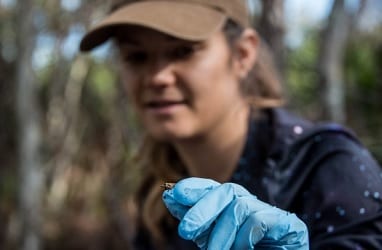A Savage World for Frogs

Courtesy of Aileen Perilla
UCF biologist Anna Savage, Ph.D., is obsessed with frogs and figuring out why they are dying at an unprecedented rate around the world.
Her latest research, published today in the journal Proceedings of the Royal Society B, suggests that natural selection as well as other evolutionary forces have shaped the evolution of immune genes in lowland leopard frog populations helping them survive a deadly fungus that’s killing off many other species worldwide.
And the die-off isn’t just of concern to biologists.
“If there is a massive, sudden change in frog populations, then maybe something in the environment is changing in a broad way that could also impact us,” she said. “Fungal pathogens are on the rise, not just Bd (the chytrid fungus, Batrachochytrium dendrobatidis) in frogs, but there is white nose syndrome in bats, snake fungal disease, and there has been an increase in human fungal pathogens across the world. So you could argue that it’s a hallmark of a broad global process such as climate change.”
Savage said she doesn’t have all the answers yet, but she’s working on them.
The New Hampshire native has been obsessed with frogs since catching them in her backyard as a child.
“My parents were hippies and we lived with nature all around us. I was homeschooled, so I could do whatever I wanted most of the day and I would go catch frogs and play with them all the time,” she said. “I have always been interested in them.”
She turned her child curiosity into a scientific passion that led her to publish several articles on one species of frog living in the Sonoran desert of Arizona. She has also worked at the Smithsonian’s National Zoo in Washington, D.C., trying to solve the mystery of why frogs show a wide range of susceptibility to Bd worldwide. And she was drawn to UCF in 2015 because of the opportunity to expand her research in a region of the United States that has a wealth of amphibian biodiversity.
Savage said she is unlikely to shift her research focus until she gets some answers. And if anyone ever doubts her commitment, they only have to visit her office to know she practically lives among the frogs.
Her bookcases are lined with rows of green frog trinkets and toys covering almost every shelf in the room and books about all kinds of frogs are stacked everywhere.
“I really do love what I do,” she said. “I guess you could say I’m a little obsessed.”
Savage earned a Ph.D. in ecology and evolutionary biology from Cornell University and continued working on amphibians with a molecular evolution postdoctoral fellowship at the Smithsonian Institution’s Center for Conservation and Evolutionary Genetics.
View original story here.
